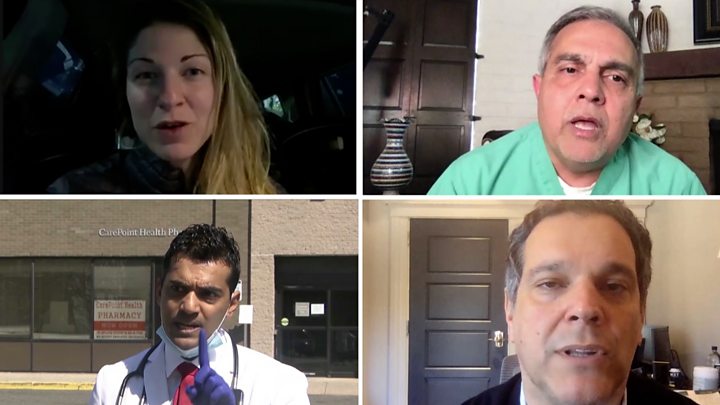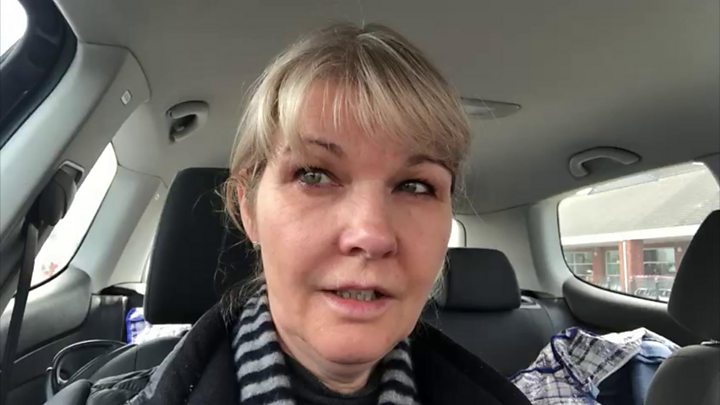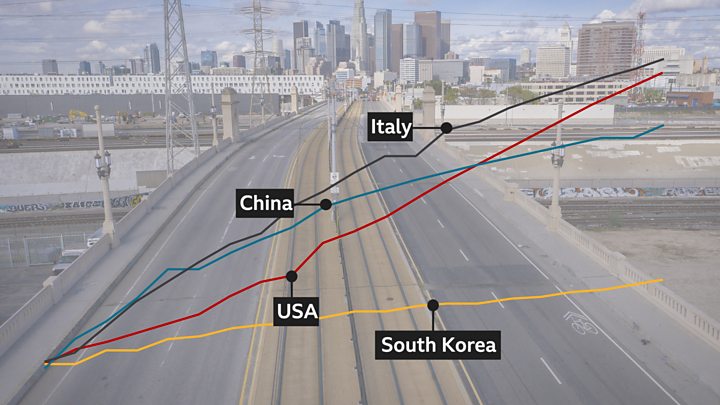Image copyright
Getty Images
Moral injury is associated with veterans – but medical workers and frontline responders are at risk too
It is widely known that veterans can return from war with Post-Traumatic Stress Disorder (PTSD). Far less appreciated is moral injury – a trauma wrapped up in guilt that we are now learning more about thanks to US-based research, writes James Jeffrey.
Moral injury most often occurs when a person commits, fails to prevent or witnesses an act that is anathema to their moral beliefs.
The Department of Veterans Affairs website likens it to psychological trauma involving “extreme and unprecedented life experience”, that can lead to “haunting states of inner conflict and turmoil”.
US-based research into moral injury is now illuminating how such injuries can impact people in all walks of life, but especially first responders and healthcare workers facing the Covid-19 coronavirus outbreak.
Amid reports of New York City’s emergency services getting overwhelmed and states struggling to provide enough ventilators, first responders and healthcare workers potentially face having to decide who gets a ventilator and who gets saved – something one nurse has described as “her biggest fear”.
Already thousands are dying in their care – and medical workers say they are facing scenarios they had never anticipated.
One doctor told the BBC the stress was intense. “Seeing people die is not the issue. We’re trained to deal with death… The issue is giving up on people we wouldn’t normally give up on.”
Arthur Markman, a professor in the department of psychology at the University of Texas at Austin, says: “Few people in healthcare have had real-life experience with triage in which a significant number of life-and-death decisions had to be made because of equipment shortages. That increases the chances that they may experience moral injury as a result of their jobs.”

Media playback is unsupported on your device
The risk is compounded, he says, by workers at the front-lines of the epidemic – in places like New York, Italy and Spain – working long shifts with little break and sleep before they get back on the job. This leaves little if any time to process an incident that, if left unattended, may prove a moral injury in the making.
“A person doesn’t just take the gloves off afterwards without that loss affecting their moral fibre, their soul,” says Nöel Lipana, who was left with a moral injury from his 2008 Afghanistan tour. He now works as a social worker while promoting better understanding of moral injuries both in the military and beyond, which includes staging art performances and a forthcoming documentary film, Quiet Summons.
“They came into this profession to help people, so what do you do when there is that sense of helplessness: you are a great physician, a great surgeon, you have some of the best medical equipment in the world, but you still can’t save someone.”
Mr Lipana notes how veterans are often the focal point of a trauma discussion that needs be much wider. Veterans Affairs treats about 500,000 veterans a year with PTSD symptoms while the National Institute of Mental Health estimates about 7.9 million civilians suffer from some form of PTSD.
“The range of human experiences that are potentially damaging, socially, psychologically, biologically and spiritually because they cause a crisis of conscience are in no way limited to the military serving in warzones,” says Brett Litz from the Massachusetts Veterans Epidemiological Research and Information Center, who is also a professor of psychological and brain sciences at Boston University.
A recent paper co-authored by moral injury experts Rita Brock and HC Palmer states that “the fight against the coronavirus is strikingly similar to battlefield medicine: desperate and unrelenting encounters with patients, an environment of high personal risk, an unseen lethal enemy, extreme physical and mental fatigue, inadequate resources and unending accumulations of the dead.”

Media playback is unsupported on your device
Mr Lipana deployed to Afghanistan as an Air Force major acting as his unit’s counter improvised explosive device (IED) officer. He oversaw and trained US troops in how to detect and disable IEDs planted by insurgents. Two army soldiers he worked alongside died in separate explosions during his deployment.
“They were killed by the thing I was meant to protect them from,” says Mr Lipana, who was also involved in an operation during which four Afghan children were killed in a blast. “You play over what you could have done, should have done differently.”
Guilt has been identified as the crucial factor that distinguishes a moral injury, even as other symptoms – anxiety and despair, flashbacks, social isolation and suicidal thoughts – overlap with PTSD.
“Traditional trauma treatment is about what’s going on between your ears – it says you are just thinking about the incident wrong,” Mr Lipana says. “That has zero to do with the connection I have with my battle buddies, those kids, with our fundamental spiritual soul connection in this universe.”
The breach of a person’s personal ethical code at the heart of a moral injury can inflict lasting behavioural, emotional and psychological damage, distorting a person’s self-identity and provoking reflexive distrust of others.
“In the military, we have it better in a way, as we get this break between deployments,” Mr Lipana says. “Firefighters and cops have to reset themselves every 12 hours and go back out on their next shift.”
Research in America has identified how for many veterans the pride in once wearing their uniform collides with a feeling of futility about what their service achieved and a belief that military leaders failed or deceived them and their fallen comrades. The resulting sense of violation from this can further fuel a lingering crisis of the conscience and spirit – deepening the moral injury.
While healthcare workers know they are doing the right thing by helping people with Covid-19, they may still be affected by responses of leaders, from the hospital hierarchy up to the national level.

Media playback is unsupported on your device
“One of the most toxic forms of moral injury is betrayal,” says Ms Brock, who is also co-author of Soul Repair: Recovering from Moral Injury After War, and the director of the Shay Moral Injury Center. “Our healthcare workers are working to save people, but they have been betrayed by the government’s inadequate response.”
Healthcare workers’ self-knowledge that they are involved in an entirely virtuous endeavour – as opposed to how veterans view the wars in Iraq and Afghanistan – can “actually make it even worse,” Ms Brock says.
“You know you are on a life-saving mission, and so you can’t understand how the president doesn’t seem to get it in the same way.”
An estimated 11-20% of the 2.7 million men and women who deployed to Iraq and Afghanistan have received a diagnosis of PTSD linked to their service. The percentage of former service members coping with moral injury appears comparable, though experts warn that the prevailing emphasis on PTSD means moral injury can often go unrecognised and ignored.
Image copyright
Submitted photo
Nöel Lipana (right) beside a British Army officer in Afghanistan
Between 2005 and 2017, 78,875 veterans took their own lives, according to the most recent data from Veterans Affairs. Currently, about 17 veterans are estimated to kill themselves each day.
The period following the acute phase of the coronavirus epidemic will likely be hardest for medical professionals in terms of psychological impact.
“Once the rest of society has said thank you and moved on to getting back to normal and thinking about the economy, that’s when these people will sit down and think, ‘What the hell happened back there?'” Ms Brock says.
Her paper with HC Palmer states that some medical personnel may take their lives because of moral injury, having been “crushed by decisions they had to make, swamped by unrelenting grief, consumed by fury and humiliation at the authorities who failed them”.
Ms Brock explains that, as in the military, often these emotions and reflections don’t sink in for months due to the initial response’s all-consuming pace.
Prof Markman stresses that “moral injuries are not inevitable” – and that medical professions will need time to reflect, and support from their managers.
“Leaders of hospitals need to communicate with the people working for them that they are using their training to make the best possible decisions under horrible circumstances. Everyone in the profession needs to recognise that they are trying to do the least harm possible in a situation in which it is impossible to provide the highest-quality care to every patient in need.”
Image copyright
Submitted photo
Nöel Lipana now produces theatrical performances to help people understand more about moral injuries
Meanwhile, experts say that individuals in society have an important role to play too.
“The rest of us can offer compassion to those who must, because of safety, keep us separated from those we love who are dying,” Brock and Palmer write.
“Essential, too, is support for the families of medical professionals who are our friends or neighbours. And every time we interact with a medical professional, we should thank them.”
